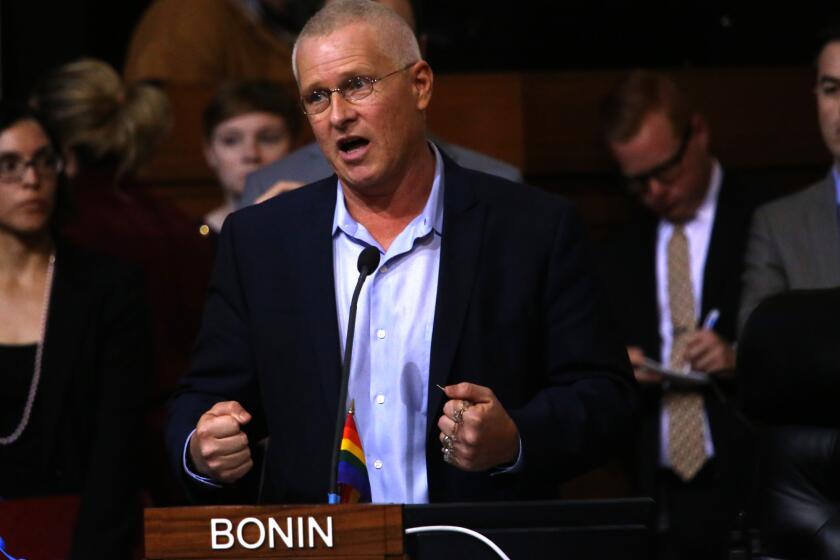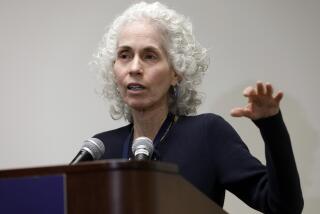Moratorium on debt collection during coronavirus crisis urged by L.A. City Council
- Share via
Debt collection should be halted during the coronavirus crisis, the Los Angeles City Council urged in a proposal that passed unanimously Wednesday.
The proposal, introduced by Councilwoman Monica Rodriguez, does not take any immediate action to halt the practice but calls on Mayor Eric Garcetti to impose a moratorium on debt collection. It also asks the mayor to declare collection and credit agencies to be nonessential businesses during the emergency order spurred by the pandemic.
“Families are already struggling and experiencing economic trauma — we don’t need the repo man showing up on doorsteps and taking away assets,” Rodriguez said in a statement.
The push was applauded by groups such as the Western Center on Law and Poverty and the California Low-Income Consumer Coalition, which assert that California has not gone far enough to ease debt collection during the emergency.
Gov. Gavin Newsom recently signed an executive order that bans wage garnishment for any financial assistance tied to COVID-19 unless the money is being garnished for child support or other specified kinds of restitution.
But “how will a bank know whether the income is COVID-related or not?” asked Jessica Bartholow, policy advocate for the Western Center on Law and Poverty. “If the banks don’t know which money is protected, you need to put things on pause.”
Amid concerns over whether such a move would hold up in court, the L.A. City Council voted down a stricter eviction moratorium Wednesday.
California’s Franchise Tax Board is also holding off on garnishing wages and imposing bank levies and liens on residents who have unpaid taxes and other government debt until the middle of July. But Californians can still face debt collection in other ways, including from private companies that have bought up unpaid debt from local governments.
Bartholow added that court closures have made it much more difficult for people to exercise their legal rights regarding debt collection.
For instance, if someone had been getting their wages garnished and their hours were abruptly cut, they have the right to go to court to get a reduction in the amount being taken out of their paycheck. They can also seek relief if a bank levy takes money that they need for basic expenses, Bartholow said.
The L.A. proposal “is exactly what we need,” Bartholow said.
Advocates pointed out that another protective measure hasn’t gone into effect: a state bill signed by Newsom that automatically sets aside the sum of $1,724 whenever a bank account is seized. The law is meant to prevent accounts of low-income families from being totally emptied, but it does not take effect until September.
“There is no activity more counterproductive right now than pushing people who are already on the financial precipice over the edge,” said Ted Mermin, director of the California Low-Income Consumer Coalition.“This is, by and large, not the mom-and-pop grocery store down the street. These are very large companies that hold most of the debt that’s being pursued.”
Industry groups, in turn, raised concerns about whether a moratorium could end up hurting consumers instead of helping them because of “unintended consequences.”
The California Assn. of Collectors said that it was open to a temporary ban on new efforts to recoup funds through bank levies, collection lawsuits and other activities and that its members would “stop collection activities with respect to any resident that says he or she has been negatively impacted financially by COVID-19.”
But the association argued that collection agencies should be able to stay open so they can process payments and update credit reports and perform legally required functions. People need to be able to reach agencies for help to pay, dispute or get information about the source of a debt and to detect identity theft, the group said.
“Professional debt collectors are a resource for the community, and an all-out moratorium on collections would take that important resource away,” its president, Shawn Suhr, told the council.
Patricia Lopez, vice president of operations for the debt collection agency USCB America, also phoned in to Wednesday’s meeting to oppose the proposal, arguing that the work done by her company helps support essential businesses including hospitals.
“One of our largest partners is the Los Angeles County healthcare system — basically the front lines on diagnosing and treating the COVID-19 virus, as well as other local government agencies who we partner with closely,” Lopez said. “Shutting down collection agencies will actually hurt many of Los Angeles’ residents and businesses.”
Garcetti said Wednesday that he had asked the city attorney to assess whether imposing such a moratorium falls under L.A.’s legal jurisdiction. If so, the mayor said, he would be “happy to not only embrace that, but to lead the nation.”
More to Read
Sign up for Essential California
The most important California stories and recommendations in your inbox every morning.
You may occasionally receive promotional content from the Los Angeles Times.












